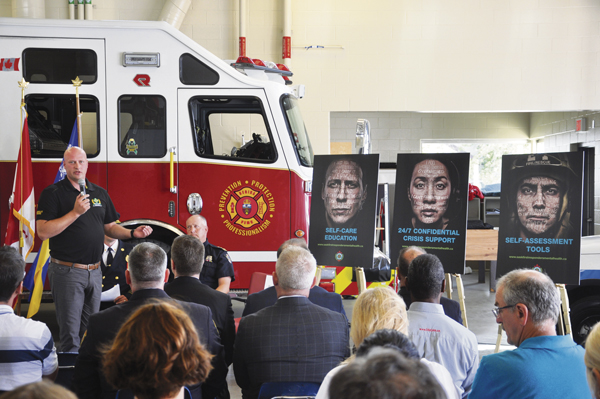
A suite of new resources has been unveiled to help Saskatchewan’s first responders take care of their mental health.
The resources, which include phone numbers for 24/7 confidential crisis support centres and organizations and peer support groups, self-care education, critical incident response strategies, self-assessment tools and guides for dealing with the Worker’s Compensation Board (WCB) were unveiled in Regina Wednesday.
The resources are available at saskfirstrespondersmentalhealth.ca. They were developed in partnership with the First Responders’ Mental Health Committee and WorkSafe Saskatchewan.
The committee was formed about nine months ago and includes representatives from police, fire, EMS, corrections and health care. It’s co-chaired by Prince Albert firefighter Jeff Reeder.
We all got together so we could work toward a common goal, as opposed to everyone working independently,” he said.
“Nine months later, we have our website officially launched and a number of different resources to help people along their healing journey and provide that road map of where to go. Hopefully, it answers a bunch of questions for people who may be searching for answers.”
The committee’s work has just begun. It’s planning to launch an anti-stigma campaign and start the discussion that it’s okay to reach out.
“People need to be educated on what the symptoms are and pay close attention to what their normal is. When something is not normal, reach out, sooner rather than later,” Reeder said.
“Now it’s time to change how we think … and create the new normal, reaching out for help.”
Reeder said the self-assessment tools are a way for first responders to give themselves an idea of where they are. They can then print them off and take them to a doctor or other primary care health professional.
Kevin Mooney, the WCB’s interim vice-president of prevention and employer services, said the resources are intended to help people reach out before it becomes an issue.
“We’re hopeful it’s going to provide them with just-in-time resources,” he said.
“the website … has two main components. One is looking for help. The other side of the conversation is looking to help. So if you’re a family member or leader in an organization, it provides resources to start the conversation, tips on how to develop a psychologically-safe workplace and tips on return to work. We’ve also got a section on claims and treatment.”
That section on claims and treatment came, in part, from conversations Mooney and the WCB have had with first responders over the last 12 months.
‘We adjusted some of our processes and answered some of those frequently-asked questions,” he said.
“People have a better experience navigating through the system (if) they know what to expect when they submit a claim through us.”
The resources on the website will be consistently reviewed. Mooney said that in addition to the diverse group of first responders at the table, there are psychologists and people trained in critical incident stress management.
“I think we’ve got the right people,” he said.
“It really leads to conversations about what the needs are.”
Mooney added that some of the resources were developed in partnership with Dr. R. Nicolas Carleton, a professor of psychology and the scientific director for the Canadian Institute for Public Safety and Research and Treatment at the University of Regina. Talks are ongoing to have Carleton review the resources on an ongoing basis.
“Resources for mental health are really evolving over time,” Mooney said.
“What we’ve got today, five years for now, maybe some of them won’t be best practices or maybe we’ll have new ones. It’s really taking a good approach to ensure we have resources on here that will relate to first responders and best practices at the time.”
For Reeder, who has gone on his own journey with post-traumatic stress disorder and operational stress injuries (OSI), it’s vital that other first responders get help before they get to the point where they have a diagnosis.
Operational stress injuries are persistent psychological difficulties resulting from operational duties.
A 2017 Canadian Journal of Psychiatry survey of 5,813 first responders indicated that almost 45 per cent screened positive for symptoms consistent with an OSI. That’s four times higher than the rate of mental injury in the general population.
“A single, traumatic incident can develop into post-traumatic stress, or a number of incidents will develop into an OSI,” he said.
It’s about educating people on how to get to those resources to be resilient and stay working, to properly manage the incidents as they come along, he added.
“We know doing nothing can lead t those. It’s time to do things differently.
“Some of the agencies are different, but the calls are the same. One thing that is consistent is the symptoms. Providing those resources for people to access is critical.”
If you need help now or are in immediate crisis, call 911 or the Crisis Centre at 306-933-6200.

